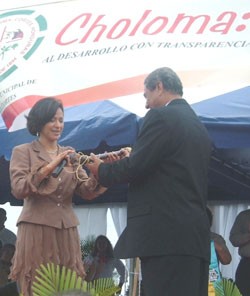
A critical moment for all democracies takes place during the transition period after elections are held and as newly elected officials assume office. In the past, long-term municipal good governance strategies have been cut short by changes in staffing and management of municipalities during and after the transfer of local government authority, thereby affecting the quality and sustainability of public services.
During the 2005 to 2006 electoral cycles, USAID implemented an electoral transition program for 31 pre-selected municipalities in Honduras that had previously demonstrated political will and a commitment to municipal development. The three-part program incorporated civil society oversight into every aspect of the program in order to improve the accountability and transparency of the transition process between outgoing and incoming administrations.
The first phase included having all mayors and mayoral candidates sign pacts committing themselves to the program’s guidelines. Trusted members of local civil society also signed the pacts as witnesses. After the elections, the second phase began with the transfer of all relevant municipal information to newly elected officials. These officials then drafted and signed municipal work plans for the early stages of their terms. Finally, in the last stage of the transition process, civil society monitored and evaluated the general performance during the first months of the new administrations, especially in the area of basic public services.
The results of the electoral transition process have been overwhelmingly positive. In the past, basic services were interrupted and public information was not readily turned over to the new administration. Under the new program, these issues were overcome. Approximately 65 percent of municipal technicians kept their jobs after the transfer of authorities (compared with 48 percent in non-participating municipalities). The program developed a political transition manual, which became a national standard approved and used by the government in all municipalities nationwide. Additionally, local citizens for the first time played a critical role in the transfer of authority in the 31 participating municipalities.







Comment
Make a general inquiry or suggest an improvement.